
Tesla has reported a sharp 40% decline in European sales, a slump that comes amidst controversy surrounding CEO Elon Musk's vocal support for newly re-elected US President Donald Trump.
The decline has sparked debates about the interplay of politics and consumer behaviour, as well as broader challenges within the electric vehicle (EV) market.
Sales Slump Amid Broader EV Decline
In November 2024, Tesla sold 18,786 vehicles across the European Union, a stark drop from the 31,810 units sold during the same month in 2023. The year-to-date figures from January to November also show a 15% decline compared to the previous year.
This downturn coincides with an overall 10% drop in EV sales across Europe, with major markets like France and Germany witnessing even steeper declines of 24% and 22%, respectively.
Despite these trends, hybrid vehicles have gained ground, with sales rising by 18.5% and overtaking petrol cars in market share.
Multiple Factors at Play
While some have attributed Tesla's sales woes to backlash over Musk's political stance, analysts argue that other factors are also contributing.
Felipe Munoz, an automotive analyst at Jato Dynamics, noted that new EU tariffs of 7% on Chinese-made cars, which include certain Tesla models, have dampened sales. He also highlighted the impact of last year's price cuts, which temporarily boosted Tesla's sales but created an unfavourable comparison for this year.
Munoz stated, "Not all the cars sold by Tesla in Europe are Chinese-made, so tariffs alone aren't to blame. The demand for EVs is cooling, competition is intensifying, and Tesla's Model Y is ageing. A refreshed version is expected next year, and this could explain the current slump."
Political Backlash
Musk's endorsement of Donald Trump during the 2024 presidential campaign has alienated some of Tesla's traditionally liberal customer base. His support included high-profile fundraising efforts and public appearances alongside Trump, followed by his appointment as one of the president-elect's leading advisers.
This shift has led to visible discontent among Tesla owners, particularly in the US, where some have affixed stickers to their cars reading, "I Bought This Before Elon Went Crazy" or "Anti-Elon Tesla Club."
In Europe, the reaction has been similarly negative in some quarters. German pharmacy chain Rossman announced in August that it would stop purchasing Tesla vehicles for its corporate fleet.
The company cited an "incompatibility" between Musk's political affiliations and Tesla's pro-environment ethos. Rossman's fleet includes 800 cars, of which around 30 are Teslas.
Ageing Lineup and Stiff Competition
Another challenge for Tesla lies in its ageing vehicle lineup. The Model Y, one of Tesla's flagship models, is awaiting a refresh, and consumers may be holding off on purchases until the updated version is released next year.
Additionally, the competitive landscape for EVs has become more crowded, with traditional automakers and newer entrants offering increasingly compelling alternatives.
Munoz believes Musk's foray into politics has had an impact but expects the effect to be temporary. He commented, "While Musk's political involvement has cost Tesla some sales, it's unlikely to be a long-term issue. The company's challenges are more about market dynamics and product lifecycle."
A Broader Market Shift
Tesla's sales decline underscores a broader shift in the EV market. As initial enthusiasm for EVs wanes and competition intensifies, manufacturers face increasing pressure to innovate and adapt to evolving consumer preferences.
For Tesla, this means addressing concerns over its ageing models, maintaining competitive pricing, and perhaps navigating the fallout of its CEO's political decisions.
The coming year, with the anticipated release of refreshed Tesla models, will be pivotal in determining whether the company can regain its momentum in Europe.







